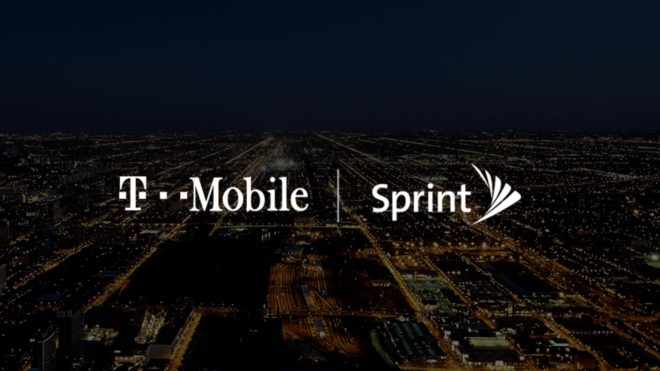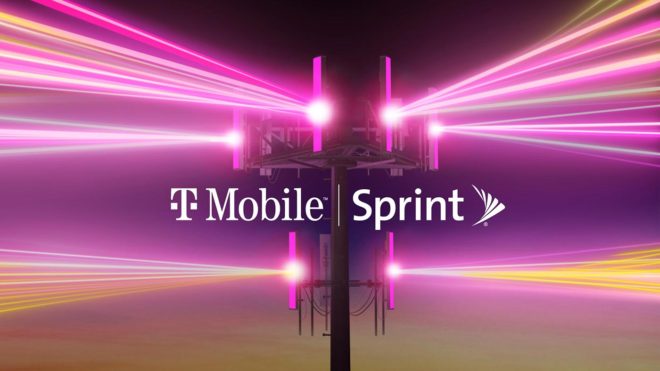T-Mobile and Sprint’s merger is officially complete

Nearly two years after T-Mobile and Sprint first announced their merger, the deal is complete.
T-Mobile says that it has officially completed its merger with Sprint to for the New T-Mobile.
Also confirmed today is that with the close of the merger, T-Mo has completed its CEO transition. That means that effective immediately, Mike Sievert is taking over the CEO role of T-Mobile from John Legere. Legere will stay on as a member of T-Mobile’s board of directors through June 2020.
“You know T-Mobile has been all about challenging the status quo…and Sprint has a track record of being a tenacious challenger and a dedicated customer advocate as well,” said Legere. “So, with innovation, disruption and obsession for the customer experience as the foundation that the New T-Mobile is built on, just imagine what’s to come.”
Under the terms of the deal, Sprint shareholders will get a fixed exchange ratio of 0.10256 T-Mobile shares for each Sprint share, or the equivalent of 9.75 Sprint shares for each T-Mo share. Additionally, Sprint parent company SoftBank Group Corp. has surrendered 48.8 million T-Mobile shares acquired in the merger deal, making SoftBank’s ratio 11.31 Sprint shares per T-Mobile share.
Now that T-Mobile has combined with Sprint, it pledges that it’s going to combine the low, mid, and high-band spectrum of the two carriers to improve its network. The New T-Mobile’s network will have 14 times more capacity in the next six years than T-Mo has today, the carrier touts.
T-Mobile is also pledging to have 5G that reaches 99% of the US population and offer average 5G speeds of greater than 100Mbps to 90% of the population within six years. Additionally, T-Mo plans to cover 90% of rural Americans with average 5G speeds of 50Mbps.
While it was campaigning for the deal to be approved by the FCC and DOJ, T-Mobile pledged to offer the same or better rate plans for T-Mo and Sprint customers post-merger. Those legacy plans will continue as New T-Mobile plans for three years after the merger or until better plans that offer a lower price or more data are available, T-Mobile explained.
T-Mo has also said it would make three Un-carrier moves as part of the merger. The first is T-Mobile Connect, a $15 rate plan that T-Mo launched early last week in response to the coronavirus pandemic.

Additionally, T-Mobile will offer a Connecting Heroes Initiative aimed at giving free unlimited talk, text, and smartphone data to every first responder at public and non-profit state and local police, fire, and EMS first responder agencies. And then there’s Project 10 Million, which will connect 10 million homes over five years with up to 100GB of free internet access per year plus a free mobile hotspot to help kids do their schoolwork.
The completion of T-Mobile and Sprint’s merger also means that Dish Network is now expected to enter the US wireless market as a fourth major competitor to replace Sprint.
As part of the US Justice Deparment’s approval of the T-Mobile-Sprint merger, Dish has agreed to buy all of Sprint’s prepaid businesses, including Boost Mobile and Virgin Mobile, as well as Sprint’s nationwide portfolio of 800MHz spectrum.
While Dish works to build out its own 5G network, it’ll have access to 20,000 cell sites and hundreds of retail locations from T-Mobile and Sprint as well as “robust access” to T-Mo’s network for seven years.
Today’s news of the merger’s closing is notable because T-Mobile and Sprint are still technically waiting for official approval of their deal from the California Public Utilities Commission. The CPUC did issued a proposal to approve the deal with plans for a vote on that proposal on April 16th. Plus, California AG Xavier Becerra has struck a deal with T-Mo and Sprint regarding their merger.
T-Mobile and Sprint were also waiting for approval from Judge Timothy Kelly, who was performing an antitrust review of the merger related to the Tunney Act, but that approval was granted today.
Source: T-Mobile
